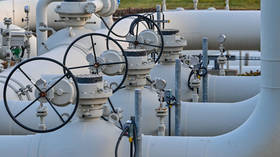
The measure would reportedly target pipelines where supplies have been cut

© Getty Images / picture alliance
The G7 and EU could prohibit the restart of Russian gas imports on routes where Moscow has cut off supplies in response to sanctions related to the Ukraine conflict, the Financial Times reported on Sunday, citing sources.
Discussions are currently being held between G7 and EU officials, and a decision is expected to be finalized at the G7 summit in Hiroshima next week, the report says.
According to a draft statement seen by the news outlet, the G7 and EU countries aim to further reduce their use of Russian energy, “including preventing the reopening of avenues previously shut down by Russia’s weaponization of energy,” at least until “there is a resolution of the conflict” in Ukraine.
The move will reportedly prevent the resumption of Russian pipeline gas flows on the routes to Poland and Germany, which had their supplies cut off last year. Both countries had received Russian gas through the Yamal-Europe pipeline, which runs from Siberia through Belarus and Poland to Germany.
Last summer, Russian energy giant Gazprom stopped supplies via the Polish section of the pipeline after Warsaw placed sanctions on Gazprom. Germany also received Russian gas via the Nord Stream 1 pipeline, which runs through the Baltic Sea. Supplies via this pipeline were reduced due to technical issues and sanctions last summer, and then completely cut off when the pipeline was rendered inoperable following a series of underwater explosions in September 2022.
While Russia once covered around 40% of the EU’s gas needs prior to the conflict in Ukraine, supplies have dwindled over the past year to less than 10%, as EU countries moved to reduce their dependence on Russian energy. However, the sanctions have so far spared Russian gas supplies, and the reported move by the G7 and EU would be the first to directly target pipeline gas exports.

One of the sources told FT that the move aims “to make sure that partners don’t change their mind in a hypothetical future” in which Moscow may decide to renew deliveries.
Earlier this week, reports emerged that the EU also plans to block Russian oil deliveries to Germany and Poland via the Druzhba pipeline as part of its next round of sanctions. Both countries have stopped receiving oil through the pipeline, but have an exemption from the EU embargo and are technically allowed to resume imports. Germany also continues to import Kazakh crude via the Druzhba line, which transits through Russia. The measure reportedly could be included in Brussels’ 11th round of sanctions on Moscow.
For more stories on economy & finance visit RT’s business section




